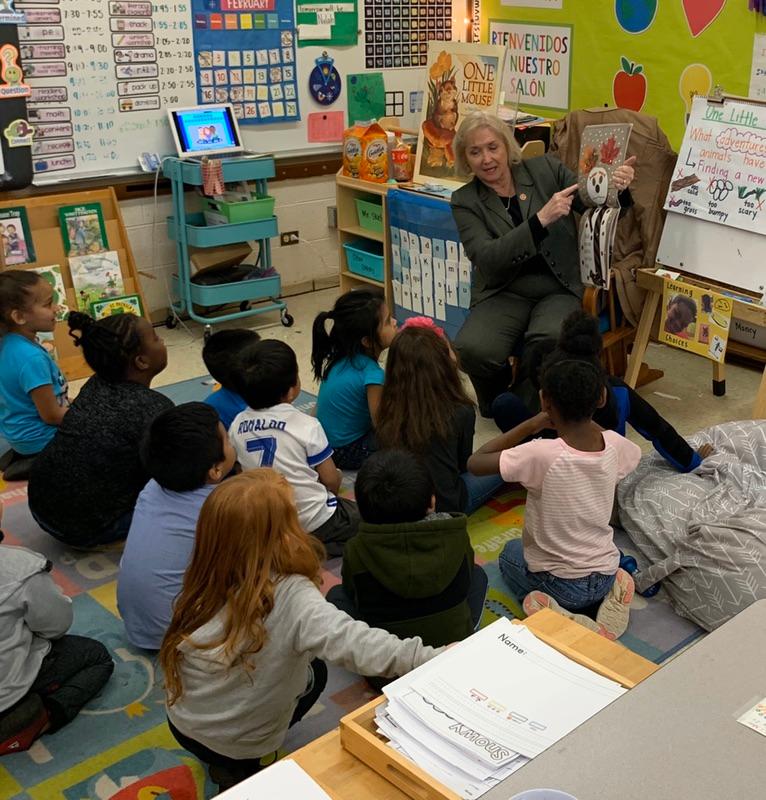
If you need any help with state services or have any questions, please either call my office at 615-741-1648 or email me at sen.becky.massey@capitol.tn.gov

State battles pandemic as devastating storms in Southeast Tennessee presents new crisis and challenges
State officials continued working hard this week to provide resources to those suffering from the health or economic effects of the global COVID-19 pandemic. New developments this week included expanding COVID-19 testing, getting federal unemployment aid to claimants, helping students get resources they need amid Governor Lee’s recommendation to close for the school year, and preparing to reboot Tennessee’s economy as the virus curve flattens.
Meanwhile, the state was dealt another blow with the devastating tornado that ripped through Hamilton and Bradley Counties on Sunday evening. Marion and Polk Counties also suffered effects from the severe storms. The deadly storms hit less than six weeks after a state of emergency was declared due to tornadoes which tore a path of destruction through portions of Middle Tennessee. Middle Tennesseans affected by the storms continue to clean up and rebuild, despite hardships presented by the coronavirus.
Governor Bill Lee said he will ask President Trump to declare a major disaster for portions of Southeast Tennessee to help residents access federal aid to recover. State and federal officials are on the ground making assessments and surveying the damage. It would be the state’s third major disaster declaration since March.
Governor Lee extends stay-at-home order through April 30 as he establishes new Economic Recovery Group to prepare to reboot Tennessee’s economy
In order to flatten the curve, Governor Bill Lee this week extended his stay-at-home order, which now mandates non-essential businesses remain closed until April 30. In making his announcement, Lee spoke about the positive trend the state is making to mitigate the spread of the disease. He said the curve is beginning to flatten and although hospitalizations are increasing, they are stable. It appears that if this trend continues, Tennessee will not need additional emergency health care facilities in the short term to meet surge demand.
As Tennessee sees those numbers continuing to go in the right direction, Lee said the state can begin to reboot the economy with the safety of Tennesseans being at the forefront of this effort. The challenge will be to reopen the economy, while managing the spread of the disease. He said this could include a change in the way that many businesses operate.
Governor Lee has appointed an Economic Recovery Group that will focus on a phased restart of the state’s economy. In addition to legislative representation, the panel will include local mayors, health care professionals, and representatives of impacted industries and businesses that are core to the state’s economy. He said the business community input is a key part to identifying working solutions that will successfully reopen the economy. This team will be looking at guidance delivered on Thursday by President Donald Trump’s administration to Tennessee and other states to stage reopening with low-risk areas.
Governor Lee is also reaching out to other Tennesseans for input on how the state can reopen more effectively. He has encouraged business owners to contact him through the TN.gov website (or you can email me) and share how COVID-19 has impacted them and offer their thoughts regarding effective solutions on restarting the economy.
I am holding a series of zoom meetings with area business operators and constituents to solicit ideas on ways to safely and successfully reboot our economy. I will be submitting these suggestions to the Governor and this group.
The Economic Recovery Group will provide industry-specific guidance so that businesses can be prepared to operate safely and protect the health of their employees and customers. The governor said that decisions would also be based on facts received every day. In addition, state officials are looking at larger data trends that show how rural and urban areas are impacted differently by the coronavirus.
Testing will be a very important part of the future as the economy is rebooted, especially when business are reopened and the virus is more likely to spread. This includes testing for antibodies, which is not currently on the market but is expected to be available soon.

State ramps up aggressive COVID-19 testing efforts with multi-week plan to expand capacity
State health officials, working with Tennessee’s Unified Command Group, Department of Military and the Tennessee Emergency Management Agency (TEMA), have launched an aggressive effort to expand COVID-19 testing to slow the spread of the disease. The testing is free of charge to participants and is available for any Tennessean who does not feel well or who are concerned about their health, regardless of the traditional COVID-19 symptoms.
The testing will begin at 15 “pop up” sites Saturday and Sunday, April 18 -19, and will continue on the weekends of April 25-26 and May 2-3. The Tennessee Department of Health will list sites available each weekend on their website and plann to cover all areas of the state.
Tennessee Department of Health nurses and Tennessee National Guard medics will operate the testing sites, with results expected to be delivered to participants within 72 hours. In addition, the rural county health departments in each of Tennessee’s 95 counties will offer free COVID-19 testing five days a week.
The announcement came as a result of vast improvements being made to the state’s testing apparatus. State officials are also ramping up targeted testing across the state, which includes vulnerable populations and those who are on the front lines in fighting the pandemic.
Governor Lee said the improved testing capacity will be a key part of Tennessee’s economic reboot. He said, “As we look to reboot our state’s economy, we must have a greater understanding of how this virus is operating in Tennessee. Expanding our COVID-19 testing capacity allows more Tennesseans to have improved access to testing which will empower citizens to make informed health decisions.”
Tennessee begins sending $600 CARES Act unemployment benefits in addition to state benefits
Claimants awaiting unemployment benefits provided as part of the federal CARES Act began receiving their checks this week. The state has started paying unemployment claimants their first $600 Federal Pandemic Unemployment Compensation (FPUC) benefits, in addition to their Tennessee Unemployment Compensation (TUC) benefit.
More that 324,000 Tennesseans have applied for unemployment benefits over the last four weeks, creating an unprecedented demand on the Tennessee Department of Labor and Workforce.
New unemployment claims filed in Tennessee the week ending:
March 14: 2,702
March 21: 39,096
March 28: 94,492
April 4: 116,141
April 11: 74,772
The state is working around the clock to process claims and provide payment to those who are unemployed. Claimants may apply online by visiting Jobs4TN.gov 24 hours a day or can call 844-432-0969 seven days a week from 8-8 EDT . The best time to access the online system is in non-peak hours.

(picture from my visit to Sam E. Hill Primary School in February)
Governor recommends schools close for remainder of school year, remains committed to student learning
On Wednesday, Governor Bill Lee called on schools throughout the state to remain closed through the end of the school year to protect the health and safety of students, teachers, parents, and families. Students have lost significant learning time in their classrooms, but the state is committed to continuing to provide resources that keep them engaged.
Schools and teachers often dually serve as caregivers for students of working parents. These school closures not only affect classroom learning, but also can have implications on the amount of care a child receives.
To help communities provide support for students and care for their overall wellbeing, especially for at-risk and vulnerable student populations, the Tennessee Department of Education Commissioner Penny Schwinn will convene a COVID-19 Child Wellbeing Task Force. Further details on the task force will be released in the coming weeks.
To continue learning at home and to provide services such as school meals, the Tennessee Department of Education has developed and designed a number of resources for optional, free use by local districts. This includes school closure toolkits; three times per week superintendent calls; instructional, daily programming on PBS and companion teacher, student and family guides; free access for all families to early childhood platform ReadyRosie; SchoolMealFinder website for families to locate meal services; a STE(A)M Resource Hub; as well as federal waivers with a focus on nutrition, accountability and special education.
Last month, the Tennessee General Assembly passed Public Chapter 652 to ensure no student, teacher, or school is adversely impacted by COVID-19 related school closures. The change waives certain K-12 education rules and requirements to help those impacted by Tennessee’s current state of emergency. It also requires the State Board of Education to revise high school graduation requirements to ensure that no high school seniors affected by the school closures fail to receive a high school diploma for which the student was on-track and otherwise eligible to receive.
Additionally, the United States Congress passed the CARES Act, which includes one-time relief funding for local school districts, intended to address challenges of providing education during the COVID-19 pandemic.
In Brief…
Tennessee to receive $2.3 billion in CARES Act funding on Friday – At Governor Lee’s press conference on Thursday, he announced that $2.3 billion in CARES Act stimulus funding will be received in Tennessee on Friday, with additional dollars expected to be delivered to the cities of Memphis and Nashville from the federal government. This funding provides tremendous opportunity, with a significant level of responsibility coming with it, to utilize the funds most effectively. As a result, Lee announced the creation of the Stimulus Financial Accountability Group to ensure proper fiscal management of stimulus funds received by the state through the CARES Act.
The administration is partnering in a bi-partisan manner with the legislature and the state’s constitutional officers to steward the funds and ensure they are well spent. The money will continue the state’s efforts to mitigate the spread of the disease and its economic impact on citizens, and to produce activity as Tennessee’s economy is reopened. The first meeting of the Stimulus Financial Accountability Group will be held remotely on April 22nd.
Tennessee State Parks closure extended– The closure of Tennessee’s state parks has been extended according to the Department of Environment and Conservation (TDEC). State officials are continuing to monitor health and safety guidance related to COVID-19 and will notify the public when the parks are reopened. “We want to make sure that when we do reopen, visitors and our park staff can feel confident in their safety,” said TDEC’s Deputy Commissioner of Parks and Conservation Jim Bryson. “With health and safety at the forefront, we look forward to getting people back into the outdoors – beyond their backyards and neighborhoods – to experience the natural wonders our state has to offer.”
Unified Command Group focused on providing resources to mitigate COVID-19 – Tennessee’s COVID-19 Unified Command Group is continuing focused efforts of disease management, improving hospital and testing capacity, and increasing the state’s Personal Protection Equipment (PPE) supply chain during the pandemic. The Unified Command Group will also weigh in on recommendations regarding how to begin the phased-in reopening of the economy.
Snapshot of pandemic’s impact on public safety spotlighted in new TBI data – The Tennessee Bureau of Investigation released data this week spotlighting the pandemic’s effects on crime. Comparing January through March of 2019 and 2020, reported instances of burglary decreased by approximately 17 percent. Burglaries reported as having occurred in a home also decreased by approximately 20 percent, while those reported in many public places increased, including convenience stores (up more than 15 percent year-to-year), liquor stores (up approximately 53 percent), and department/discount stores (up more than 15 percent). Crimes reported as having a domestic violence nexus decreased by approximately 4 percent comparing the same time periods. The combined number of reported thefts and crimes designated as violent in nature decreased by more than 5 percent.
For information on State Senators including phone numbers and email addresses, click Tennessee State Senators.
For House members, click Tennessee House Members
For all other information on the General Assembly including legislation, schedules and videos, click Tennessee General Assembly
As always thank you for continued support!
Sincerely,
Becky Massey
District 6 Senator
615-741-1648.
